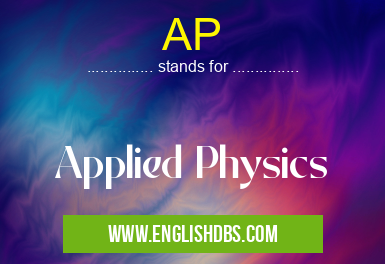What does AP mean in PHYSICS
AP is an abbreviation commonly used in the field of science, particularly in physics. It stands for Applied Physics and refers to the practical application of physical principles and theories in various fields.

AP meaning in Physics in Academic & Science
AP mostly used in an acronym Physics in Category Academic & Science that means Applied Physics
Shorthand: AP,
Full Form: Applied Physics
For more information of "Applied Physics", see the section below.
What does AP Stand for?
AP is the short form for:
- Applied Physics
AP in SCIENCE
Applied Physics involves the use of fundamental physics principles to solve real-world problems and develop new technologies. It encompasses a wide range of applications, including:
- Engineering: Designing and building structures, machines, and systems.
- Materials Science: Developing and characterizing new materials with specific properties.
- Electronics: Creating and improving electronic devices and circuits.
- Energy: Generating, distributing, and storing energy efficiently.
- Medical Physics: Applying physics principles to medical diagnostics and treatments.
- Environmental Physics: Studying and mitigating environmental issues.
Essential Questions and Answers on Applied Physics in "SCIENCE»PHYSICS"
What is Applied Physics?
Applied Physics is the application of theoretical physics to practical problems. It involves solving real-world challenges using the principles and methods of physics, particularly in areas like engineering, technology, and medicine.
What areas of study are included in Applied Physics?
Applied Physics encompasses a broad range of fields, including optics, electronics, materials science, acoustics, biomedical physics, and energy. It focuses on the practical applications of physical principles in these areas.
What are the career opportunities for Applied Physicists?
Applied Physicists are in high demand in various industries, including aerospace, telecommunications, healthcare, energy, and manufacturing. They can work as researchers, engineers, product developers, and consultants.
What qualifications are required to become an Applied Physicist?
Typically, a Master's or PhD in Applied Physics or a related field is required. Strong analytical skills, problem-solving abilities, and a deep understanding of physics are essential.
What skills are important for Applied Physicists?
Applied Physicists require a combination of technical expertise, analytical thinking, and communication skills. They should be proficient in experimental design, data analysis, and the application of physical principles to real-world problems.
What is the difference between Applied Physics and Theoretical Physics?
Applied Physics focuses on the practical applications of physical principles, while Theoretical Physics seeks to develop and understand fundamental theories of nature. Applied Physics is often more experimental, while Theoretical Physics is more mathematical and theoretical.
What are the advantages of studying Applied Physics?
Applied Physics provides a strong foundation in physics and its practical applications, equipping graduates with skills that are highly sought after in various industries. It offers opportunities for research, innovation, and problem-solving in real-world settings.
Final Words: AP (Applied Physics) plays a vital role in technological advancements and improving our understanding of the physical world. It combines theoretical knowledge with practical applications, leading to innovations that benefit various industries and sectors.
AP also stands for: |
|
| All stands for AP |
